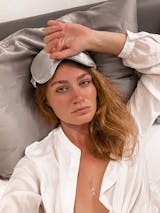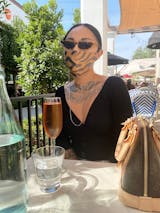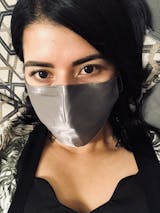When we think of "luxury," words like opulence, extravagance, and indulgence come to mind. It's an industry built for people of affluence and wealth to enjoy the finer things in life. Luxury is a lifestyle, after all. And although luxury products are of better quality and tend to last longer than non-luxury items, manufacturing luxury products isn't typically sustainable or ethical.
On the other hand, sustainability can often be associated with affordability, eco-conscious operations, and tailored for the "hippy" or conscious consumer. "Sustainable luxury", therefore, is an oxymoron.
Yet, the world is shifting, and we are learning to live a more thoughtful and less wasteful life. From lab-grown leather to spiderless silk, technology makes it easier for luxury brands to switch to more sustainable production.
In this article, we'll discuss how the luxury industry has evolved, and we'll highlight some products that are perfect purchases to transition to a more sustainable luxury lifestyle.
Unsustainable Luxury
We're living in a time where, never before in the industrialized world, have so many people from different walks of life come together for one cause; saving our planet. The luxury industry is known to exploit our planet's resources — from animal furs to excessive and unnecessary packaging to the overharvesting of precious resources. But in the past decade, we've seen an incredible shift.
The unethical and often barbaric practice of fur farming has been banned or restricted in around 20 countries (1). This is still such a small number, but this number will keep increasing with some hope.
We're also seeing designers step up and change the way they operate from making the switch to animal-free, vegan products and using the advancements in biotechnology in place of declining natural resources. We're also seeing some brands taking on a more circular approach.
What Makes a Brand Sustainable?
You've heard us talk about sustainability a lot. But the key factors to consider when a brand is deemed to be sustainable are:
- Ingredients/Materials
- Packaging
- Operations
Ingredients/Materials
It all starts from the conception stage of a brand's products. Where are they sourcing from? Are they ensuring the integrity of the artisans, farmers, and suppliers are met? It's reported that 71% of retailers and suppliers in the UK think that there are likely slaves in their supply chain (3). It is such a shocking revelation, yet nobody seems to be doing very much about it.
For a brand to be truly sustainable, they would do what Tiila Abbitt from Āthr Beauty does and not source anything from anywhere without first investigating that resource's ethical and sustainable viability. If a resource is not 100% ethically or sustainably sourced, or if the supply chain is vague or lacks transparency, Tiila finds another source. She will not compromise the quality of her products or moral integrity.
This is something many brands don't do. Most prominent brands outsource to partnering companies. Take chocolate giants Mars, Nestlé, and Hershey, for example. They were facing child slavery charges earlier this year when eight men claimed they were forced to work as children on plantations under disgraceful conditions. The men claimed that thousands of children are forced to work at an Ivory Coast cocoa plantation, yet the chocolate companies state that they were unaware of the child slavery or the conditions the workers were forced to endure.
Though highly improbable, the corporations maintain their innocence. While they've committed to abolishing child slavery, there are still reportedly 1.56 million children working on cocoa farms in Ivory Coast (5). Hmm.
It's especially concerning when we're seeing small startups with very little capital in comparison, doing everything to ensure that their products cause no harm and are conflict-free. If small startups can do it, why can't large corporations?
Moving on.
Luxury brands are starting to wake up when it comes to consumer products. They're starting to think about where they get their materials from and what they are made from, which we'll talk about a little later.
Packaging
This is another area that has claimed some attention from luxury brands. But this is still a massive issue in the industry, as often a luxury item comes with excessive and unnecessary packaging to create this whole unboxing experience. Consumers tend to pay more to have more expensive packaging (6).
Think about products like perfumes, with their extravagant bottles and boxes that no doubt end up in landfills. It's what consumers expect from a luxury brand, so we suspect it's going to take a while for this to change, as brands will need to somehow create a luxury experience without all of the waste.
Operations
Lastly, a brand needs to be operating more sustainably. No brand is 100% perfect, but if they make some strong efforts to be more sustainable and ethical in all they do, they get a gold star.
There's no way to measure how sustainable a brand is, but there is a way to determine, using your judgment, whether a brand you support is at least trying.
The brands we onboard are doing their part for our planet. These brands need to be taking adequate steps in a more conscious direction. Things like carbon-neutral shipping, setting up a mail-back collection program for customers' packaging, collaborating with environmental funds and foundations, and being a strong voice of authority are all important factors that can play into the entirety of a brand's sustainability-ness.
Earthwise Beauty is a luxury skincare brand that commits to creating gorgeous and effective products while not harming our environment. Through their philanthropic efforts, they support farmers in South America, make regular donations to foundations every quarter, and bring awareness to the oil drilling crisis the Amazon rainforest faces when someone buys their products. Their products are in glass, which is a much more eco-friendly material than conventional plastic.
A Change in Luxury
As mentioned earlier, we're seeing some luxury brands make critical changes to their operations and the materials they source to lower their impact on the environment. Here are two ways luxury brands are innovating:
Biotechnology
Biotechnology might just be the answer to overharvesting and overconsumption of natural resources. Scientists say that if we don't implement strategies today that minimize and lower our consumption of natural resources, we won't have anything left to the source. Biotechnology is essentially technology based on biology. Scientists can mimic the molecular structure of plants and other organisms, creating a safer and more sustainable option.
Bolt Threads are a material solutions company founded in 2009 (8). They pull their inspiration from nature and currently have three products, Mylo™; Microsilk™; and B-Silk™ Protein.
Mylo™ derives from mycelium, an ecological connective tissue found on our earth. Microsilk™ is a synthetic and sustainable version of spider silk, a solid and pliable material. B-Silk™ is a replacement for silicone and keratin in beauty products.
Luxury brands like Stella McCartney and Lululemon have been using this technology for a few years, while many other brands are also looking to collaborate, all in sustainability.
Another product we'll see more of in the future is vegan leather, made from plant materials, like mushrooms, or lab-made leather, made from salvaged plastic (9). And we'll also see other lab-made materials in place of animal-byproducts (10).
Upcycled Byproducts
A circular economy is going to become mainstream. This is where products or materials destined for the landfill are salvaged and given a new purpose, like an old bicycle turned into a kid's swing set. Or an old, torn denim jacket is made into drink coasters.
In skincare, brands like UpCircle Beauty and Three Ships salvage byproducts from other industries, like coffee grounds, juice waters, and leftover bark from the lumber industry, to create effective and natural skincare. But we're also starting to see it in other sectors.
Perfume company Les Fleurs Du Dechet has made a perfume called "I Am Trash" (7). It's made with salvaged flowers and fruits.
A circular economy is perhaps the most crucial trend in recent times. For too long, shoppers have consumed their way through the world, buying up a storm and taking as much as they can — with most of our stuff usually ends up in landfills. We all know this is unsustainable, so we'll be seeing more of a circular economy in the coming months and years.
Sustainable Luxury Products
The common misconception is that "sustainable" doesn't equal "luxury." This is just not the case. So let's squash this mistaken belief once and for all, and here are my top picks for perfect purchases for a sustainable luxury lifestyle.
Silk Bedding
We spend a third of our lives asleep, so it's essential to have high-quality bedding. One of the most sustainable fabrics out there is silk. It's made using silk from silkworms, so it isn't for vegans. However, it uses less water and pesticides than other fabrics, like cotton. Silk is also hypoallergenic, naturally antibacterial, and thermo-regulating, so you'll stay warm in Winter and cool in Summer.
My Pick: 30 Momme Pure Organic Luxury Silk Bed Sheets and 100% Silk Blanket
All of Fait avec Coeur's silk products are OEKO-TEX®, BSCI, and ISO certified.
Ayurvedic Skincare
Our skin deserves to be pampered without impacting our environment negatively. Try a luxury skincare range that pulls from Ayurvedic tradition while catering to the faster-paced lifestyle most of us live.
My Pick: M.S.Skincare
Candles
A home is not complete without a signature smell. Many candles contain toxic ingredients that can cause hormone disruption and migraines. So choose candles that have clean ingredients and low-waste packaging.
My Pick: Woodlot Candles
Travel
Although things are not back to normal just yet, many of us are starting to travel again. But when we travel, we forget to take care of ourselves, and we reach our destination exhausted and disheveled after a long-haul flight. Travel in style and luxury with a silk travel set that includes a silk sleeping mask, a silk face mask, and a silk pillowcase.
My Pick: Essential Travel Gift Set
It's always been a moral dilemma to buy luxury products with promises of a luxurious lifestyle with no genuine regard for their impact on our environment. But with the change in the air, it's exciting to see the industry finally make some progress to become more mindful and sustainable. Many products and brands are now trying to lift their standards for our planet and our future. Hopefully, they will pave the way for every brand to follow suit.
Emma Jade has been a trained esthetician for over 15 years. She is a sustainable skincare writer, educating and building awareness around proper skin health that doesn't cost the earth.
Some of the products promoted in our blog are from our online store. Many others are brands we have researched and found to be great examples of sustainable, ethical, and innovative brands in their field, and we don't profit from mentioning them in our blog. #CollaborationOverCompetition










